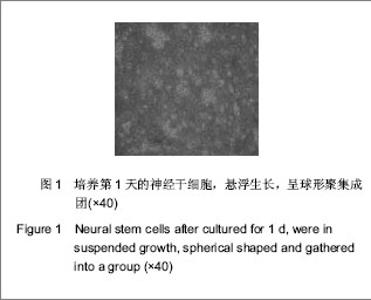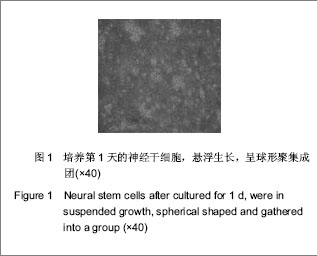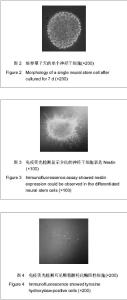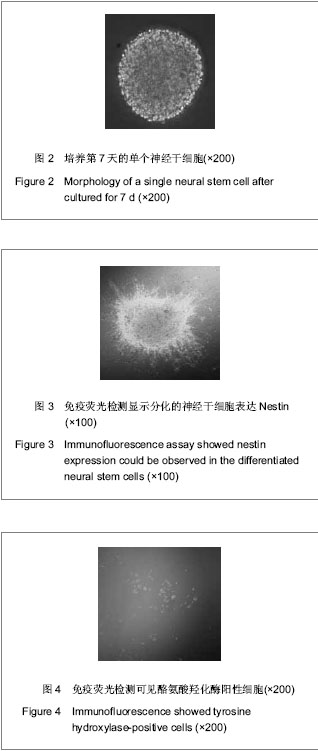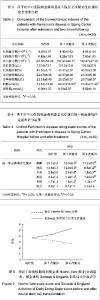Chinese Journal of Tissue Engineering Research
Previous Articles Next Articles
Efficacy and safety of neural stem cell transplantation for the treatment of Parkinson’s disease
Zhang Xiao-ying
- Department of Neurology, Siping Center Hospital, Siping 136000, Jilin Province, China
-
Received:2012-10-27Revised:2012-12-28Online:2013-07-02Published:2013-07-02 -
About author:Zhang Xiao-ying, Chief physician, Department of Neurology, Siping Center Hospital, Siping 136000, Jilin Province, China xiaoying12368@sina.com
CLC Number:
Cite this article
Zhang Xiao-ying. Efficacy and safety of neural stem cell transplantation for the treatment of Parkinson’s disease[J]. Chinese Journal of Tissue Engineering Research, doi: 10.3969/j.issn.2095-4344.2013.27.014.
share this article
| [1] 胡国华,宋月平,董丽华,等.微囊化PC12细胞脑内移植治疗帕金森病的实验研究[J].中风与神经疾病杂志,2005,22(1):4-6. [2] Davis AA, Temple S. A self-renewing multipotential stem cell in embryonic rat cerebral cortex. Nature. 1994;372(6503): 263-266. [3] Svendsen CN, Caldwell MA, Shen J, et al. Long-term survival of human central nervous system progenitor cells transplanted into a rat model of Parkinson's disease. Exp Neurol. 1997;148(1):135-146. [4] Weiss S, Dunne C, Hewson J, et al. Multipotent CNS stem cells are present in the adult mammalian spinal cord and ventricular neuroaxis. J Neurosci. 1996;16(23):7599-7609. [5] Moe MC, Westerlund U, Varghese M, et al. Development of neuronal networks from single stem cells harvested from the adult human brain. Neurosurgery. 2005;56(6):1182-1188. [6] Gage FH. Mammalian neural stem cells. Science. 2000;287 (5457):1433-1438. [7] Deng XL, Liu RE, Feng ZT, et al. In vitro culture and differentiation of rat embryonic midbrain-derived neural stem cells. Neural Regen Res 2008;3(11):1241-1244. [8] Yun MJ,Wang LZ,Wang YC, et al.In vitro growth, differentiation and biological characteristics of neural stem cells.Neural Regen Res 2006;1(4):364-367. [9] Ke CL, Chen BL, Guo SL, et al. Differentiation of embryonic versus adult rat neural stem cells into dopaminergic neurons in vitro. Neural Regen Res 2008;3(8):832-836. [10] Meissner KK, Kirkham DL, Doering LC.Transplants of neurosphere cell suspensions from aged mice are functional in the mouse model of Parkinson's. Brain Res. 2005;1057 (1-2): 105-112. [11] Armstrong RJ, Harrower TP, Hurelbrink CB, et al. Porcine neural xenografts in the immunocompetent rat: immune response following grafting of expanded neural precursor cells.Neuroscience. 2001;106(1):201-216. [12] Harrower TP, Tyers P, Hooks Y, et al. Long-term survival and integration of porcine expanded neural precursor cell grafts in a rat model of Parkinson's disease. Exp Neurol. 2006;197(1):56-69. [13] Bhattacharya N, Chhetri MK, Mukherjee KL, et al. Can human fetal cortical brain tissue transplant (up to 20 weeks) sustain its metabolic and oxygen requirements in a heterotopic site outside the brain? A study of 12 volunteers with Parkinson's disease. Clin Exp Obstet Gynecol. 2002;29(4):259-266. [14] Liu WG, Chen Y, Li B, et al. Neuroprotection by pergolide against levodopa-induced cytotoxicity of neural stem cells. Neurochem Res. 2004;29(12):2207-2214. [15] Kim SU, Park IH, Kim TH, et al. Brain transplantation of human neural stem cells transduced with tyrosine hydroxylase and GTP cyclohydrolase 1 provides functional improvement in animal models of Parkinson disease. Neuropathology. 2006;26(2):129-140. [16] Ryu MY, Lee MA, Ahn YH, et al. Brain transplantation of neural stem cells cotransduced with tyrosine hydroxylase and GTP cyclohydrolase 1 in Parkinsonian rats. Cell Transplant. 2005;14(4):193-202. [17] Ko JY, Lee JY, Park CH, et al. Effect of cell-density on in-vitro dopaminergic differentiation of mesencephalic precursor cells. Neuroreport. 2005;16(5):499-503. [18] Kwon YK. Effect of neurotrophic factors on neuronal stem cell death. J Biochem Mol Biol. 2002;35(1):87-93. [19] Wagner J, Akerud P, Castro DS, et al. Induction of a midbrain dopaminergic phenotype in Nurr1-overexpressing neural stem cells by type 1 astrocytes. Nat Biotechnol. 1999;17(7): 653-659. [20] Lee MA, Lee HS, Lee HS, et al. Overexpression of midbrain-specific transcription factor Nurr1 modifies susceptibility of mouse neural stem cells to neurotoxins. Neurosci Lett. 2002;333(1):74-78. [21] Zhou C, Wen ZX, Shi DM, et al. Muscarinic acetylcholine receptors involved in the regulation of neural stem cell proliferation and differentiation in vitro.Cell Biol Int. 2004; 28(1):63-67. [22] Andersson E, Jensen JB, Parmar M, et al. Development of the mesencephalic dopaminergic neuron system is compromised in the absence of neurogenin 2. Development. 2006;133(3):507-516. [23] Haas SJ, Wree A. Dopaminergic differentiation of the Nurr1-expressing immortalized mesencephalic cell line CSM14.1 in vitro. J Anat. 2002;201(1):61-69. [24] Gates MA, Torres EM, White A, et al. Re-examining the ontogeny of substantia nigra dopamine neurons.Eur J Neurosci. 2006;23(5):1384-1390. [25] Fukuda H, Takahashi J, Watanabe K,et al. Fluorescence-际上activated cell sorting-based purification of embryonic stem cell-derived neural precursors averts tumor formation after transplantation.Stem Cells. 2006;24(3):763-771. [26] Si LH, Xu TM, Wang FZ, et al. X-box-binding protein 1-modified neural stem cells for treatment of Parkinson’s disease. Neural Regen Res. 2012;7(10): 736-740. [27] 沈岳飞,陈梅玲,罗彦妮,等.抗坏血酸诱导新生鼠神经干细胞向多巴胺能神经元的分化[J].中国组织工程研究与临床康复,2009, 13(23):4411-4416. [28] 丁继固,丁文杰,李光,等.胶质源性神经营养因子体外诱导小鼠胚胎中脑神经干细胞分化的研究[J].中国康复医学杂志,2008, 23(4): 341-343. [29] 丁继固,丁文杰,李光.白细胞介素1β体外诱导鼠胚胎中脑神经干细胞的分化[J].中国组织工程研究与临床康复,2008, 12(3): 406-410. [30] 黄娟,戴冀斌,陆蔚天,等.GDNF与IL-1β体外诱导小鼠中脑神经干细胞分化作用的实验研究[J].中国组织化学与细胞化学杂志, 2006,15(2):119-123. [31] Armstrong RJ, Hurelbrink CB, Tyers P,et al. The potential for circuit reconstruction by expanded neural precursor cells explored through porcine xenografts in a rat model of Parkinson's disease. Exp Neurol. 2002;175(1):98-111. [32] Kim JH, Auerbach JM, Rodríguez-Gómez JA, et al. Dopamine neurons derived from embryonic stem cells function in an animal model of Parkinson's disease. Nature. 2002;418(6893): 50-56. [33] Vescovi AL, Parati EA, Gritti A, et al. Isolation and cloning of multipotential stem cells from the embryonic human CNS and establishment of transplantable human neural stem cell lines by epigenetic stimulation. Exp Neurol. 1999;156(1):71-83. [34] 郑敏,王亚平,裴雪涛.神经干细胞移植对帕金森病模型大鼠的治疗作用[J].基础医学与临床,2007,27(8):841-845. [35] 梅斌,戴冀斌,章军建,等.神经干细胞移植对帕金森病鼠旋转行为的影响[J].武汉大学学报:医学版,2003,24(3):216-218,231. [36] 郭安臣,李学坤,澹台冀澄,等.神经干细胞移植对帕金森病模型小鼠行为的影响[J].中国康复理论与实践,2003,9(7):399-400. [37] 蒋明,陈新成,吴旻,等.鼠胚神经干细胞移植对帕金森模型大鼠的治疗作用[J].中国组织工程研究与临床康复,2011,15(49): 9178-9181. [38] 杨林,夏鹰,赵洪洋,等.超顺磁氧化铁标记神经干细胞移植治疗帕金森病大鼠脑MRI改变的研究[J].临床神经病学杂志,2007, 20(2): 115-118. [39] 邓兴力,王应莉,杨智勇,等. 超顺磁氧化铁、增强型绿色荧光蛋白双标中脑神经干细胞移植治疗帕金森病[J].中华实验外科杂志, 2010,27(8):1107-1109. [40] 柯春龙,陈白莉,金华伟,等.神经干细胞诱导分化为多巴胺能神经元与胚胎中脑多巴胺能神经元移植治疗帕金森病效果比较[J].中国组织工程研究与临床康复,2008,12(16):3019-3023. [41] 尹丰,田增民,刘爽,等.神经细胞移植对帕金森病大鼠模型的治疗作用观察[J].解放军医学杂志,2008,33(9):1113-1116. [42] 韩志桐,苏宁,吴日乐,等.GFP转基因小鼠神经干细胞移植治疗大鼠帕金森病的实验研究[J].临床神经外科杂志,2012,9(3): 139-142. [43] 张耀芬,李振洲,郑静晨,等.TH基因修饰的永生化神经干细胞移植对帕金森病大鼠行为和多巴胺代谢的影响[J].武警医学,2011, 22(1):34-37,42. [44] 周政,阴金波,杨辉,等.基因修饰的神经干细胞脑内移植后TH表达和神经递质的变化[J].立体定向和功能性神经外科杂志,2003, 16(1):1-6. [45] 徐胜利,周明,陈彪.神经营养因子基因修饰的神经干细胞在帕金森病大鼠模型中的治疗作用[J].中华老年医学杂志,2010,29(1): 58-62. [46] 刘卫国,陈生弟,陆国强,等.neurturin基因转染c17.2神经干细胞移植治疗帕金森病模型大鼠的实验研究[J].中华老年医学杂志, 2007,26(2):136-139. [47] 田美玲,谭雪锋,金国华,等.核受体相关因子1基因转染神经干细胞移植治疗帕金森病[J].解剖学报,2011,42(5):600-604. [48] 田增民,刘爽,李士月,等.人神经干细胞临床移植治疗帕金森病[J].第二军医大学学报,2003,24(9):957-959. [49] 陈涛,田增民,尹丰,等.神经干细胞移植治疗帕金森病的临床研究[J].中国微侵袭神经外科杂志,2012,17(10):452-453. |
| [1] | Pu Rui, Chen Ziyang, Yuan Lingyan. Characteristics and effects of exosomes from different cell sources in cardioprotection [J]. Chinese Journal of Tissue Engineering Research, 2021, 25(在线): 1-. |
| [2] | Zhang Xiumei, Zhai Yunkai, Zhao Jie, Zhao Meng. Research hotspots of organoid models in recent 10 years: a search in domestic and foreign databases [J]. Chinese Journal of Tissue Engineering Research, 2021, 25(8): 1249-1255. |
| [3] | Wang Zhengdong, Huang Na, Chen Jingxian, Zheng Zuobing, Hu Xinyu, Li Mei, Su Xiao, Su Xuesen, Yan Nan. Inhibitory effects of sodium butyrate on microglial activation and expression of inflammatory factors induced by fluorosis [J]. Chinese Journal of Tissue Engineering Research, 2021, 25(7): 1075-1080. |
| [4] | Wang Xianyao, Guan Yalin, Liu Zhongshan. Strategies for improving the therapeutic efficacy of mesenchymal stem cells in the treatment of nonhealing wounds [J]. Chinese Journal of Tissue Engineering Research, 2021, 25(7): 1081-1087. |
| [5] | Liao Chengcheng, An Jiaxing, Tan Zhangxue, Wang Qian, Liu Jianguo. Therapeutic target and application prospects of oral squamous cell carcinoma stem cells [J]. Chinese Journal of Tissue Engineering Research, 2021, 25(7): 1096-1103. |
| [6] | Xie Wenjia, Xia Tianjiao, Zhou Qingyun, Liu Yujia, Gu Xiaoping. Role of microglia-mediated neuronal injury in neurodegenerative diseases [J]. Chinese Journal of Tissue Engineering Research, 2021, 25(7): 1109-1115. |
| [7] | Li Shanshan, Guo Xiaoxiao, You Ran, Yang Xiufen, Zhao Lu, Chen Xi, Wang Yanling. Photoreceptor cell replacement therapy for retinal degeneration diseases [J]. Chinese Journal of Tissue Engineering Research, 2021, 25(7): 1116-1121. |
| [8] | Jiao Hui, Zhang Yining, Song Yuqing, Lin Yu, Wang Xiuli. Advances in research and application of breast cancer organoids [J]. Chinese Journal of Tissue Engineering Research, 2021, 25(7): 1122-1128. |
| [9] | Wang Shiqi, Zhang Jinsheng. Effects of Chinese medicine on proliferation, differentiation and aging of bone marrow mesenchymal stem cells regulating ischemia-hypoxia microenvironment [J]. Chinese Journal of Tissue Engineering Research, 2021, 25(7): 1129-1134. |
| [10] | Zeng Yanhua, Hao Yanlei. In vitro culture and purification of Schwann cells: a systematic review [J]. Chinese Journal of Tissue Engineering Research, 2021, 25(7): 1135-1141. |
| [11] | Kong Desheng, He Jingjing, Feng Baofeng, Guo Ruiyun, Asiamah Ernest Amponsah, Lü Fei, Zhang Shuhan, Zhang Xiaolin, Ma Jun, Cui Huixian. Efficacy of mesenchymal stem cells in the spinal cord injury of large animal models: a meta-analysis [J]. Chinese Journal of Tissue Engineering Research, 2021, 25(7): 1142-1148. |
| [12] | Hou Jingying, Yu Menglei, Guo Tianzhu, Long Huibao, Wu Hao. Hypoxia preconditioning promotes bone marrow mesenchymal stem cells survival and vascularization through the activation of HIF-1α/MALAT1/VEGFA pathway [J]. Chinese Journal of Tissue Engineering Research, 2021, 25(7): 985-990. |
| [13] | Shi Yangyang, Qin Yingfei, Wu Fuling, He Xiao, Zhang Xuejing. Pretreatment of placental mesenchymal stem cells to prevent bronchiolitis in mice [J]. Chinese Journal of Tissue Engineering Research, 2021, 25(7): 991-995. |
| [14] | Liang Xueqi, Guo Lijiao, Chen Hejie, Wu Jie, Sun Yaqi, Xing Zhikun, Zou Hailiang, Chen Xueling, Wu Xiangwei. Alveolar echinococcosis protoscolices inhibits the differentiation of bone marrow mesenchymal stem cells into fibroblasts [J]. Chinese Journal of Tissue Engineering Research, 2021, 25(7): 996-1001. |
| [15] | Fan Quanbao, Luo Huina, Wang Bingyun, Chen Shengfeng, Cui Lianxu, Jiang Wenkang, Zhao Mingming, Wang Jingjing, Luo Dongzhang, Chen Zhisheng, Bai Yinshan, Liu Canying, Zhang Hui. Biological characteristics of canine adipose-derived mesenchymal stem cells cultured in hypoxia [J]. Chinese Journal of Tissue Engineering Research, 2021, 25(7): 1002-1007. |
| Viewed | ||||||
|
Full text |
|
|||||
|
Abstract |
|
|||||
